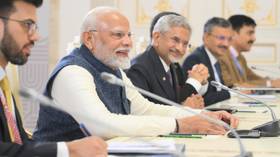India and China prepare to complete border disengagement – media
Indian and Chinese military officials are in the process of implementing disengagement agreements reached at the highest levels earlier this month, defense sources have told India Today. They have indicated that the process is now in its final phase, as both sides reportedly dismantle temporary structures and fortifications built in the disputed areas of Depsang and Demchok in Eastern Ladakh in the four-and-a-half years since the troops clashed in 2020.
The two sides are scheduled to cross-verify the dismantling on Tuesday, a step necessary for the official acknowledgment of the disengagement, the report noted.
Last week, New Delhi and Beijing announced a breakthrough in border talks that have been ongoing since the deadly standoff in June 2020, which resulted in casualties on both sides. That clash was the deadliest of its kind since the 1962 war between the two Asian neighbors and marked a significant deterioration in China-India relations.
The Indian Foreign Ministry stated that the two sides have penned arrangements to patrol areas along the Line of Actual Control (LAC). Patrolling is expected to resume by the end of the month, according to unnamed defense officials. The report also indicated that this agreement specifically pertains to these two friction points, while discussions continue regarding other disputed areas.
Indian External Affairs Minister S. Jaishankar noted on Sunday that the resumption of patrolling along the LAC should be viewed as a restoration of the arrangements that existed prior to the 2020 border standoff.
The announcement about the breakthrough in border talks came on the eve of the BRICS summit in Kazan, Russia. Two days later, Chinese President Xi Jinping and Indian Prime Minister Narendra Modi held their first bilateral meeting in almost five years on the summit’s sidelines. During the meeting, Modi welcomed the “agreement for complete disengagement and the resolution of issues.”
Xi emphasized that the two sides should strengthen communication and cooperation, as well as properly manage differences and disagreements. He stated that both nations should “continue to uphold their important understandings,” asserting that “China and India are each other’s development opportunities rather than threats, and cooperative partners rather than competitors,” as communicated by Beijing.
Speaking in New York last month, Jaishankar remarked that “the India-China relationship is key to the future of Asia,” noting that the “parallel rises” of the two countries present a “very unique problem” in today’s global politics. “In a way, you can say that if the world is to be multi-polar, Asia has to be multi-polar. Therefore, this relationship will influence not just the future of Asia but perhaps the future of the world as well,” Jaishankar noted.
Earlier this year, he suggested that India should “welcome competition” and have “more confidence” in response to China’s growing influence in South Asia. New Delhi has been ramping up its military and strategic presence in South Asia and the Indian Ocean region while engaging with neighboring countries to counter Beijing’s rising influence in the area.






Comments are closed.